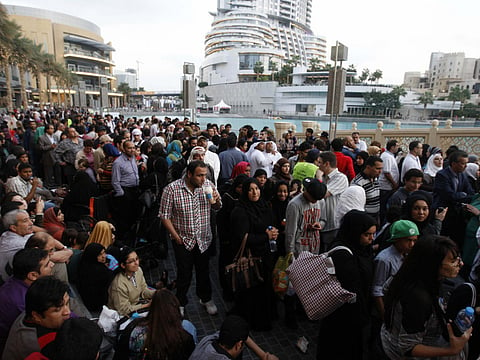Why Arabs must care about climate change
The Gulf will have its fair share of ecological and environmental challenges as a result of global warming

There was little coverage in the Arab world of the climate change summit, which ended in Paris last week with the adoption of what was described as a historic agreement that culminated after four years of difficult negotiations. Few Arab leaders attended the summit and even fewer took to the podium to talk about the issue. It was as if the Arabs had little or no contribution to this global issue and were unconcerned about the agreement’s commitments, goals and outcomes.
One could say that the Arab world had other, more immediate, issues on its mind. Certainly, the rising threat of Daesh (the self-proclaimed Islamic State of Iraq and the Levant), the Syrian civil war, the conflict in Yemen and the chaos in Libya have kept the Arabs busy for the last few years. When they meet, Arab leaders discuss possible actions against geopolitical challenges such as Iran’s regional ambitions, the Palestinian issue, the fall in oil prices, extremism and terrorism. In fact these are the issues that dominate news bulletins and keep commentators busy.
Global warming and climate change rarely get the coverage they deserve even though we live in a part of the world that will be most affected by both. Several studies have suggested that climate change will have drastic effects on the Middle East. Some of these effects include severe water shortages, severe weather events, such as droughts and floods, desertification, loss of arable land, shifting of ecosystems, species loss and coral reef bleaching. These ecological and environmental events will have political ramifications on the region’s states. Water shortages will heighten regional tension, especially between countries sharing water resources. Poorer countries will face difficulties in providing essential needs to their own people leading to internal instabilities, migrations, civil strife and potential rise of extremism.
Struggle for shared water resources will affect Syria, Lebanon, Israel/Palestine, Iraq, Turkey, Egypt, Sudan, Libya and Tunisia. Droughts and civil war have driven hundreds of thousands of people to migrate from East and Central Africa through Egypt, Libya, Morocco and Tunisia. As Europe closes its doors before illegal migrants from North Africa, these Arab countries will have to deal with a flood of refugees that will add to their economic, social and political problems.
The Gulf will have its fair share of ecological and environmental crises as a result of climate change. According to a study by the Institute for Atmospheric and Climate Science in Zurich, published in October, “the combination of high temperatures and humidity could, within just a century, result in extreme conditions around the Gulf that are intolerable to humans, if climate change continues unabated”.
Author of the study, Christopher Schar, wrote that, “temperatures are projected to reach unacceptable levels” in Kuwait City and other parts of the Middle East, where “threats to human health may be much more severe than previously thought and may occur in the current century”.
An American study about climate change suggested that the combination of heat and humidity could push temperatures to record levels, above 60 degrees Celsius, in “hotspots” such as Kuwait City, Al Ain in the UAE and Doha in Qatar. It added that rising temperatures will affect religious rituals including Haj, which is “likely to become hazardous to human health, especially for the many elderly pilgrims, when Haj occurs during the summer”.
The same study, authored by professors Jeremy Pal and Elfatih Eltahir, at the Massachusetts Institute of Technology, predicts that extreme heat waves, more intense than anything ever experienced on Earth, would kick in after 2070 and that the hottest days of today would by then be a near-daily occurrence.
A report in the Guardian newspaper said that the Gulf, where populations are rising quickly, was hit in 2015 by one of its worst-ever heat waves, where temperatures topped 50 degrees Celsius and led to a significant number of deaths.
Not all countries in the region are taking these warnings seriously, though.
United States President Barack Obama has praised the Paris agreement, describing it as the best chance we have to save the planet. And with about 200 countries committing to it, including China and the United States, our region will have to respond and cooperate. This region may not be the biggest polluter, but our way of life will change if the world fails to act.
One thing that the Paris agreement is trying to achieve is to get towards 100 per cent clean energy, producing zero net greenhouse gas emissions between about 2050 and 2080. This spells the end of world’s dependence on fossil fuels, including oil. This reality may be too difficult for some Gulf nations to accept, but others, like the UAE, are already taking action to prepare for a clean and renewable energy world.
But as the world attempts to meet the parameters of the Paris agreement, climate change and global warming will continue to affect the Middle East for many years to come. This is the time to admit that new challenges are in order for our region and that we must be ready and willing to deal with them before it is too late.
Osama Al Sharif is a journalist and political commentator based in Amman.


